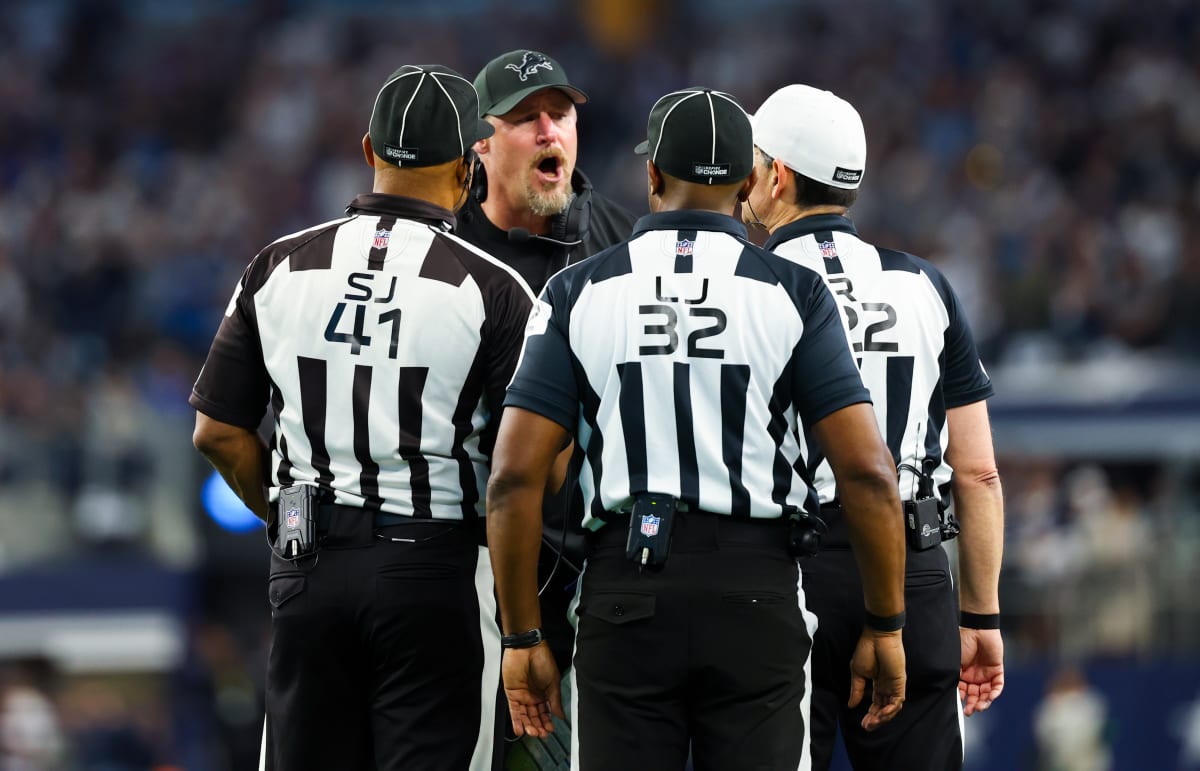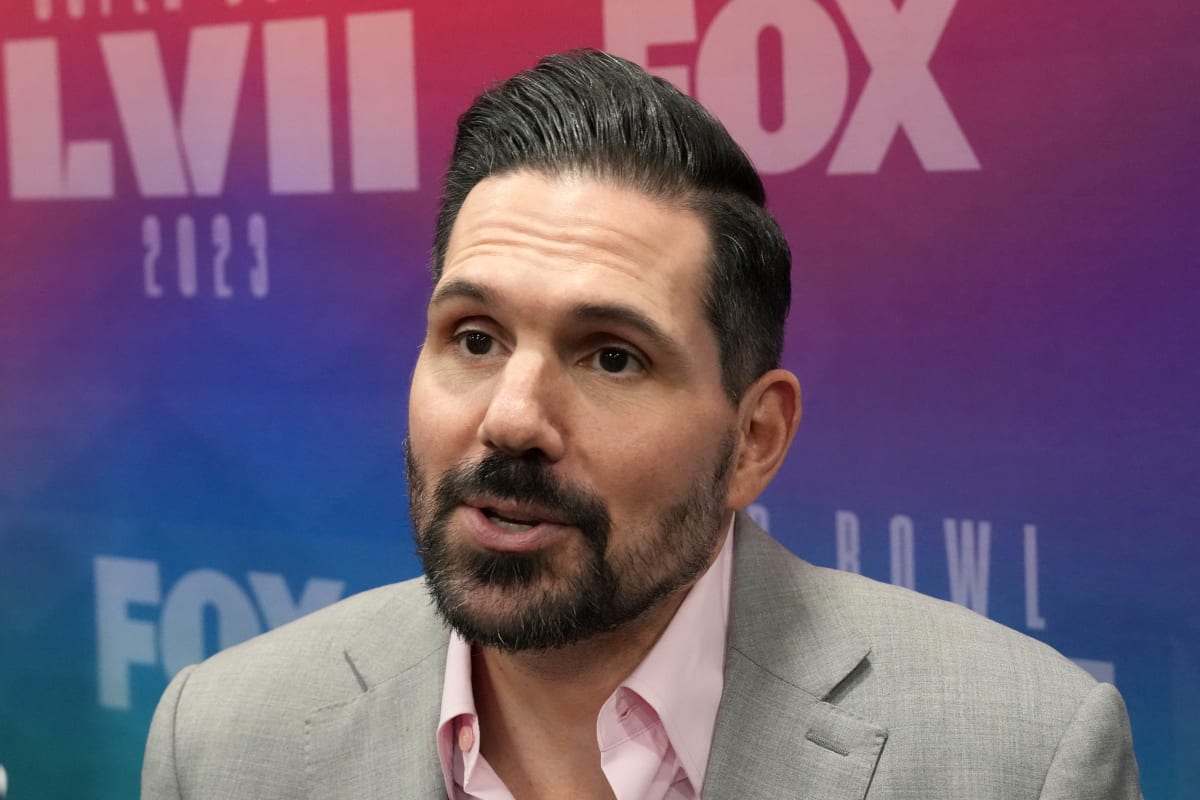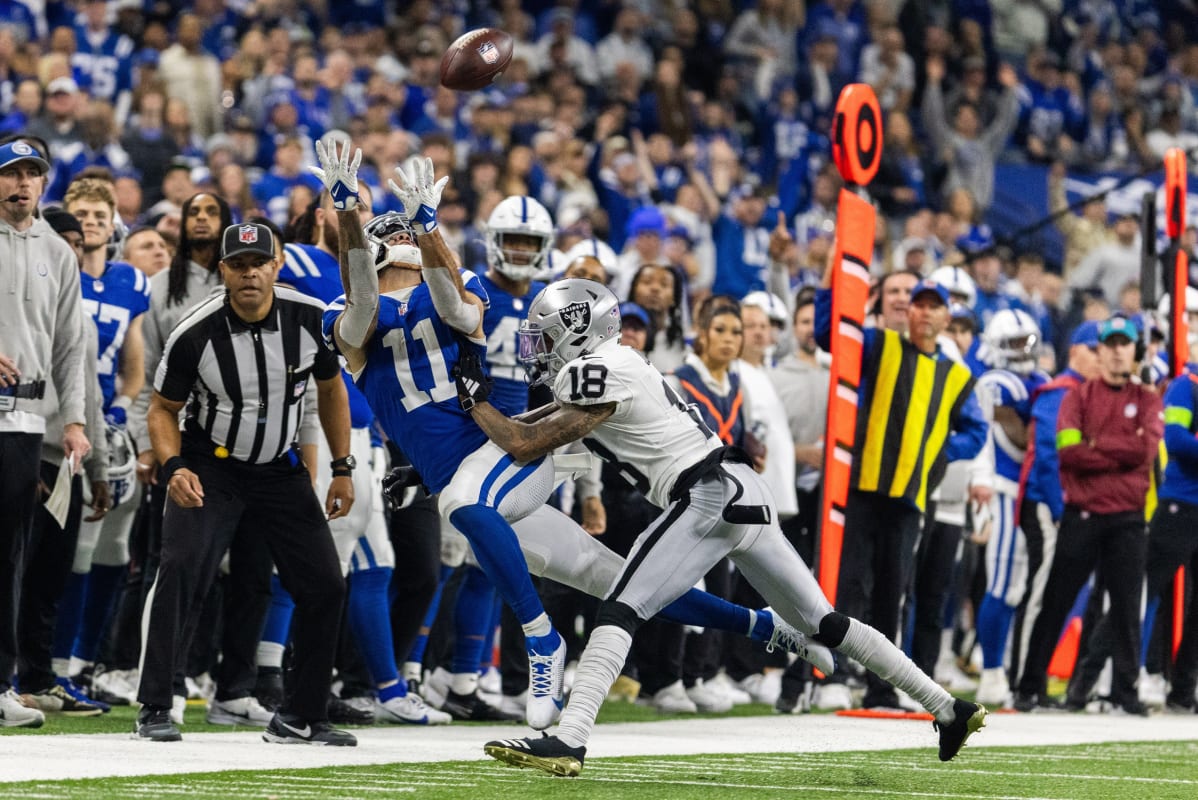Rigged. Incompetent. Embarrassing.
Three words fans have used to describe NFL officiating of 2023 regular-season games on social media, spewing their anger at the people in stripes.
In most cases, the vitriol is misguided or misdirected, with those enraged better served looking at their respective teams and their failures instead.
But this season officiating issues have grown so large that they’re impossible to ignore. While human error will always be a reality, the number of mistakes needs to dwindle significantly for America’s most popular sport.

Kevin Jairaj/USA TODAY Sports
In prime-time games alone this year, the NFL has had the following calls (or noncalls) result in controversy:
- Week 1: Kansas City Chiefs tackle Jawaan Taylor’s repeated alignment issues at the line of scrimmage.
- Week 1: The New York Jets’ Chazz Surratt wasn’t called for tripping on a game-winning punt return touchdown against the Buffalo Bills.
- Week 4: The Jets’ Sauce Gardner was called for pass interference on the Chiefs’ Marquez Valdes-Scantling.
- Week 6: A blatant pass interference by the Bills’ Taron Johnson was ignored on the final play vs. the Giants.
- Week 7: The Miami Dolphins were called for 10 penalties, and the Philadelphia Eagles were flagged for none in a Sunday Night Football win.
- Week 13: 19 penalties for 257 yards were called in the Dallas Cowboys–Seattle Seahawks game.
- Week 13: Valdes-Scantling gets run over but no DPI was called in the Green Bay Packers’ win over the Chiefs.
- Week 16: The Baltimore Ravens were called for a safety after Lamar Jackson was tripped by an official.
- Week 17: Brad Allen’s crew botched the Detroit Lions’ eligible players against the Cowboys on a two-point conversion.
The list goes on, and none of those were the Indianapolis Colts–Cleveland Browns debacle, which essentially cost the former a playoff spot. The same is true of the Bills-Chiefs spectacle, where Kadarius Toney was correctly called for being offsides, but only after the infraction was ignored throughout the game.
And that leads into the biggest complaint among NFL personnel that Sports Illustrated spoke to on the condition of anonymity about the officiating.
Leading up to the playoffs, four league sources shared their biggest frustrations with the officials and the NFL’s handling of them. They also answered the question about one thing they’d do if given ultimate power to make a change to the rules.
Finally, former NFL rules analyst for Fox Sports and former NFL vice president of officiating Dean Blandino responded to each thought with his own insight. Let’s dive in.
Current general manager: “I think the biggest issue is a lack of competent leadership with our officials, which leads to incompetent officiating. We need new leadership at the department, a position that is expected to open up after the season, I think. But there is no consistency at all. It’s not even from group to group. It’s the same group within games.
“We need new leadership with a new plan. Veteran officials are leaving, and the training the new officials are getting doesn’t seem to be as effective. It’s obvious watching these games. So they need to throw more resources into their training and development.”
Blandino: “To me, that’s spot on. I’ve probably said that to a few people over the course of the last several months. Having been in that role, from an officiating leadership perspective, it’s such a critical role in the league office. And it’s difficult. There are so many different stakeholders. You have all the officials, and trying to get all 17 officiating crews and seven officials on each crew to see the game the same way, it’s an incredible challenge, but you feel like the league needs to look at that. The structure of the department, the leadership, how clubs are being communicated with. My understanding right now is there’s some uncertainty of who they should go to, who we’re communicating with in the leadership department.
“It starts at the top with the leadership. What is their relationship with the leadership committee? How are they communicating that direction to the competition committee, to the on-field officials? What goes into the training? How are we identifying officials at the college level? Our hiring practices—are we getting the best officials? How are we working with our first- and second-year officials? How are we getting them up to speed? I would agree with that 100%.”

Kirby Lee-USA TODAY Sports
AFC defensive coordinator: “There is poor communication and no consistency.
“I would say they need to be full time. They need more training and accountability.”
Blandino: “From an accountability standpoint, I think they’re held accountable. I just don’t think even from a club perspective, they don’t know how much goes into that from an evaluation perspective. I can’t think of another profession that, in the moment, they’re evaluated with replay. The scrutiny is incredible, and then you’ve got fans, the players, the coaches, the media, the broadcasters and then that evaluation during the week where every play of every game is looked at. Every call that is made, every call that should have been made. They are evaluating them, and it is a comprehensive system. Those evaluations accumulate throughout the year, and the higher-rated officials will work in the postseason, and the lower-rated officials will not.
“If you’re not meeting the standard over the course of one year … or two years, they’re going to be let go. It’s not publicized, but I do think they’re held accountable. I do think there are more opportunities whether you call them full time or not. I don’t care about the title, but I do think there are more opportunities to get better, and maybe it’s in the offseason, working more with the clubs. They have a dead period just like the players do. There’s a union that collectively bargains with the league, and the officials have a dead period after the Super Bowl until May 15, where the league can’t ask them to do anything unless they’re compensated and it’s negotiated with the union. I think there’s an opportunity there to do more things and prepare for the season.”
NFC defensive coordinator: “There’s wild inconsistency week to week and crew to crew.
“[We need] full-time officials graded on a universal scale. The top 20% get promoted, and the bottom 20% get fired. Officiating shouldn’t be a hobby. Players quit their part-time jobs 50 years ago. It’s time to catch the officiating up.”
Blandino: “He’s right. The players quit their jobs. But the money the players are making is not the money the officials are making. You still have a lot of officials who are very successful in their other professions, who would be risking a lot if they just gave that up. Now, the dynamic has changed. When I started in the mid-to-late ’90s officials had a full-time job, and they officiated on the side. Now, when you get to the NFL or even major college football, you might have a job on the side. You might not. But I don’t think that the idea of needing to turn over the staff, maybe it’s not 20%, because that can lead to inconsistency if you’re bringing in a whole bunch of new officials every year. But maybe it’s 10%.
“The reality is there are officials who are underperforming. There are officials who should be let go. And the league needs to continue to work at that and bring in good people to replace them. But I do think that challenge of officials who do have other jobs, you might lose some good officials, but the league has the resources to say, You’re going to be full-time. You’re going to have benefits. You’re going to have everything. And then there is some safety in case you tear an ACL or an Achilles. Now you’ve given up that other profession, and you’re no longer able to officiate. But I think they can figure that out. The resources are there to do it.”

Trevor Ruszkowski/USA TODAY Sports
AFC defensive coordinator: “Always frustrated that defensive pass interference and illegal hands to the face are not officiated the same for offensive pass interference, holds and illegal hands. It only takes a little to get called on the defense but [it] must be obvious to ever get called on the offense.
“I would make punches to the head and face mask that runners use on defenders, that we glorify as stiff-arms, illegal. They are blatant hands to the face and neck area. We don’t allow defensive linemen to do it to offensive linemen.”
Blandino: “He’s right. Start with pass interference. The rules apply to both players. In the rule book, it doesn’t say defensive pass interference, it says pass interference. Then there’s a list of things players can’t do, or it’s a foul and applies to both players. But the way the game is played and the way officials have looked at it for so long, one player is trying to catch the ball and the other player is trying to stop him from catching the ball. The defensive player is always starting at a disadvantage from that perspective. I do think you see plays where the defensive player gets in better position and the receiver has to become the defender, and there’s no flag thrown. But if it’s the other way around, there would be three flags thrown.
“I don’t know what the answer is. We’ve always taught you have to look at both players the same. They both start off on the same plane. And then if one player is playing the ball and the other isn’t, the one not playing the ball, whether he’s offensive or defensive, the red flags go up, and you are going to pay more attention.
“He’s also right on the stiff-arm. The competition committee has talked about it. They allow the runner to do that because the theory is it’s a defense mechanism that the runner can use to protect from being tackled or certain contact. But you see these stiff-arms, and it is hands to the face, and it would be called in other areas. It puts the defender at such a disadvantage. And what we see is a lot of times with these stiff-arms, the defender is just grabbing whatever they can grab and they grab the face mask or a horse collar. I know because I’ve been in those conversations, the competition committee has talked about it, but they don’t want to take away that protection. Now, if they actually grab the mask or deliver a blow, they don’t call that very often.”
Ultimately, officiating has become more of a topic than ever before for a multitude of reasons. Across the U.S., gambling is being legalized in a way thought impossible even 20 years ago. Not only are more states allowing for wagers to be placed, but they can be done from the comfort of someone’s home, betting both before and during games in real time.
In short, the money is enormous on every game, every week. And when individual investment goes beyond fandom and into the wallet, it feels personal.
Additionally, social media has only added to the problem, as fans, analysts and outlets crop controversial plays and amplify them to millions of people who didn’t see the call (or noncall) in real time, which leads to chaos.
The reality is nothing has changed over the decades in terms of quality, and perhaps that’s both human nature and inherently the problem.
Go watch an NFL game from 30 years ago on YouTube, and calls are missed throughout. The difference between then and now? Most of those games were seen and written about only on a local scale. Unless it was a game-deciding play, it likely didn’t make SportsCenter.
And, from 1992 to ’98, replay was banned before being reinstituted in ’99. Once a call was made, it was final. It was rarely shown for minutes on end during the telecast.
For the NFL, officiating will always be a challenge. The main issue currently is it doesn’t appear the league is making enough attempts to fix it, whether through more transparency, the addition of a sky judge or another solution.
Officials have always had a tough, thankless job. That’s not going to change.
It’s time the NFL listens to those within and around its sport, and does everything possible to remedy the problem.



.png?w=600)



